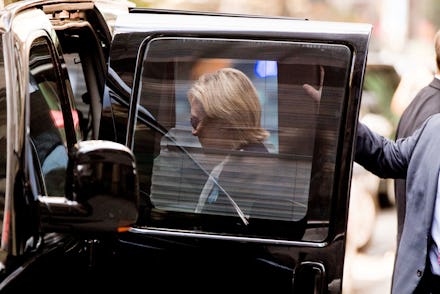Forget conspiracy theories: Why Clinton and Trump both owe voters more health details

Hillary Clinton's stumbling departure from Sunday's ceremony commemorating the 15-year anniversary of 9/11 was an early Christmas gift to her critics.
Images of the former secretary of state being assisted to her car fed right into the conspiracy theories and innuendos about her health peddled by Donald Trump, his supporters and Clinton haters everywhere.
After she abruptly broke away from the proceedings at ground zero, Clinton's doctor issued a statement saying she'd gotten overheated and dehydrated but was already on the mend.
The doctor's big reveal: Clinton had been diagnosed with pneumonia two days earlier.
The usual buzz grew louder and extended to major media outlets and their pundits as Clinton went on to scratch two days of travel plans. Why had her team waited to say she was ill? What kind of pneumonia did she have?
What else did she have to hide?
Presidential campaigns are notoriously grueling, particularly in the home stretch. Candidates are under intense, relentless pressure to stick to their schedules — with a smile — as they hopscotch the country from rally to fundraiser to debate.
And yes, it was fairly warm and humid in New York on Sunday.
After leaving the 9/11 commemoration, Clinton emerged from a pitstop at her daughter's apartment with a smile and assurances that she felt quite fine.
Assurances are no longer enough — and that goes for Trump as well.
Apparently the Republican presidential nominee knows this, or at least his campaign advisers do. On Monday, he announced he'd soon be releasing the results of a recent physical.
The real-estate mogul previously released a December health letter that launched a thousand jokes with his doctor's over-the-top assertion that Trump would "be the healthiest individual ever elected to the presidency" and described his lab test results as "astonishingly excellent" without actually providing any of them.
Clinton's last full report from her physician contained more detail by far than Trump's. Her doctor listed a concussion, deep vein thrombosis and hypothyroidism as part of her medical history, but pronounced her in overall excellent health and fit for presidential service.
That letter was dated July 28, 2015.
Conspiracy theories aside, the fact remains: Whichever one wins, Clinton at 68 and Trump at 70 would be among the oldest presidents ever elected in the United States.
For that reason, among others, voters are more than justified in expecting detailed, honest updates on both candidates' health.
As David Scheiner, who served as Barack Obama's personal physician for 22 years before he became president, wrote for the Washington Post,
"Throughout this country's history, from Woodrow Wilson's stroke to Franklin D. Roosevelt's polio to John F. Kennedy's Addison's disease, Americans have repeatedly not been given important medical information about their leaders. It's no wonder they are asking so many questions this year, but speculation and unanswered questions don't serve anyone very well — not the voters, not the candidates."
At a fundamental level, the health of the president is not only a matter of public interest but one of national security. Candidates provide details about their fitness not to satisfy some prurient interest among the electorate about their headaches, indigestion or skinned knees. They do so to offer a professional medical opinion that they are capable of doing the job.
Neither a president with a chronic ailment (such as FDR and JFK lived with) nor one who suddenly gets sick on the job (think of the time George H.W. Bush vomited at a state dinner in Japan) is a new thing. And voters can be forgiving of many types of health issues in their leaders: George W. Bush's admission of having had a drinking problem didn't keep him out of the Oval Office.
Voters can be forgiving — that is, if they're told the truth.
Sen. John McCain faced innumerable questions about his fitness in 2008, when he sought the presidency as a 72-year-old former prisoner of war with a history of skin cancer. In response, he released eight years of medical records for public review.
After nearly eight years, voters will soon be faced with selecting a successor for Obama, one of the nation's younger presidents and one with an admirable health history.
It's not a decision to be taken lightly. And it involves going beyond rousing stump speeches and partisan attack ads.
Trump has spent enough time making insinuations about Clinton's health to expose himself to fair criticism that he's been far too stingy with his own records.
If she releases updated records of her own, Clinton can do a few things at once. She may not silence her most rabid critics, but she can allay the concerns of rational, undecided voters. And being forthcoming is the perfect way to deal with naysayers who have insisted for years that the Clintons are secretive to a fault.
Hillary Clinton or Donald Trump may each believe they're the most qualified to serve as America's next president and that they're entitled to their privacy when it comes to the information they may only prefer to share with their doctors and kin.
But voters can only make an informed decision in November if they have real information. That includes details about how the candidates would lead, what policies they would pursue — and whether they have any medical conditions that might impede their ability to serve.
If Clinton and Trump are indeed judged by a qualified physician to be fit enough to be president, there is no plausible reason for them to withhold the information that proves it.
And if either one is not fit, that is something that — as a matter of duty and conscience — they should feel obligated to reveal.